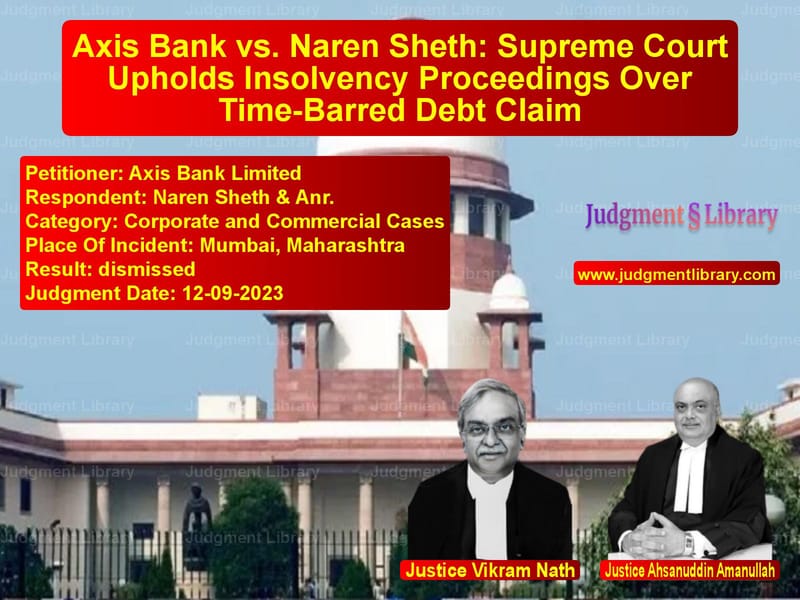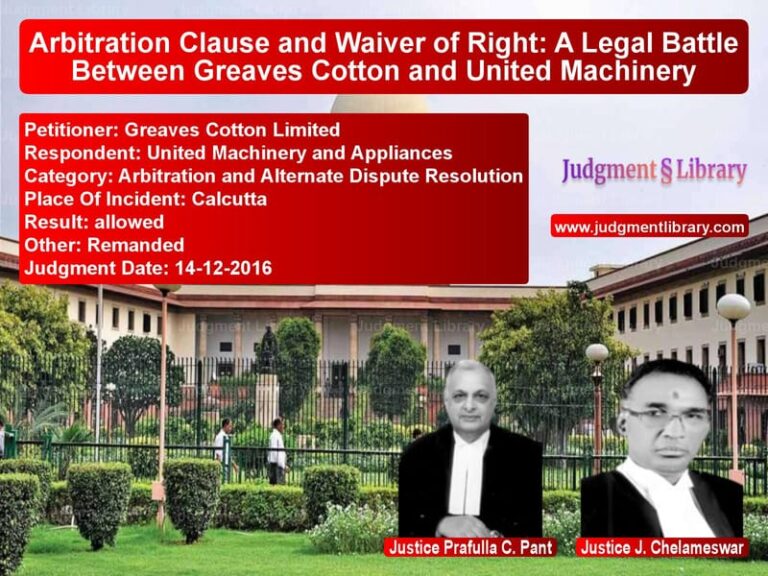Axis Bank vs. Naren Sheth: Supreme Court Upholds Insolvency Proceedings Over Time-Barred Debt Claim
The case of Axis Bank Limited vs. Naren Sheth & Anr. deals with a significant legal issue under the Insolvency and Bankruptcy Code, 2016 (IBC). The Supreme Court was called upon to determine whether the initiation of insolvency proceedings under Section 7 of the IBC was valid despite a time-barred debt claim and whether the delay in filing was justifiable under the Limitation Act, 1963.
Background of the Case
The case revolves around a financial dispute wherein the appellant, Axis Bank Limited, challenged the admission of an insolvency petition filed by State Bank of India (SBI) against a corporate debtor, Shreem Corporation Limited (formerly Rajput Retail Ltd.). The dispute arose over a substantial unpaid debt and the question of whether the debt claim was still valid.
Axis Bank had previously entered into a leave and license agreement with Universal Premises and Textiles Pvt. Ltd. (later merged into Shreem Corporation Ltd.), providing a security deposit of Rs. 87.56 crore for office space in a building named Solaris “C.” When Universal Premises failed to return the deposit, Axis Bank initiated legal proceedings and obtained a decree for repayment from the Bombay High Court.
Meanwhile, SBI had extended credit facilities to Shreem Corporation and declared it a Non-Performing Asset (NPA) on June 28, 2013. In 2020, SBI initiated insolvency proceedings under Section 7 of the IBC against Shreem Corporation for non-payment of dues.
Legal Issues Raised
The Supreme Court had to address the following key legal questions:
- Whether the limitation period for initiating insolvency proceedings had expired.
- Whether acknowledgment of debt in balance sheets and One-Time Settlement (OTS) proposals extended the limitation period.
- Whether the IBC proceedings should continue despite Axis Bank’s objections.
Petitioner’s Arguments (Axis Bank)
Axis Bank, through its senior counsel, argued:
- The insolvency petition filed by SBI in 2020 was time-barred as per the Limitation Act, 1963.
- The corporate debtor was classified as an NPA in 2013, and the three-year limitation period ended in 2016, making the insolvency petition legally invalid.
- While SBI relied on acknowledgments of debt in financial statements and settlement proposals, these were not sufficient to extend the limitation period.
- IBC proceedings should not override the well-established principles of limitation.
Respondent’s Arguments (State Bank of India)
SBI countered with the following arguments:
- The corporate debtor had acknowledged its debt multiple times through balance sheets and One-Time Settlement (OTS) proposals.
- The limitation period restarted each time an acknowledgment was made, thus keeping the debt claim alive.
- As per Section 18 of the Limitation Act, an acknowledgment of liability extends the period of limitation for initiating legal action.
- The National Company Law Appellate Tribunal (NCLAT) had correctly upheld the insolvency admission.
Supreme Court’s Ruling
The Supreme Court ruled in favor of SBI and upheld the admission of insolvency proceedings. The Court examined the acknowledgment of debt principle under Section 18 of the Limitation Act and its applicability to insolvency proceedings.
1. Acknowledgment of Debt and Extension of Limitation
- The Court found that Shreem Corporation Ltd. had acknowledged its debt through its balance sheets for FY 2014-15 and OTS proposals in 2017 and 2018.
- Each acknowledgment extended the limitation period by three years, keeping the debt claim valid.
- The insolvency petition filed in January 2020 was within the extended limitation period.
2. Applicability of Limitation Act to IBC
- The Court reiterated that the Limitation Act applies to IBC proceedings, but acknowledgment of debt can reset the limitation period.
- As per Dena Bank vs. C. Shivakumar Reddy (2021), balance sheets and settlement offers can be treated as valid acknowledgments.
3. Impact on Axis Bank
- Since SBI was a financial creditor with a claim of over Rs. 681 crore, its rights could not be overridden by an unsecured creditor like Axis Bank.
- The Court ruled that Axis Bank must seek relief within the insolvency resolution process instead of challenging SBI’s petition.
Final Judgment
The Supreme Court:
- Dismissed Axis Bank’s appeal.
- Held that SBI’s insolvency petition was valid and filed within the extended limitation period.
- Clarified that the IBC takes precedence over individual creditor claims in insolvency resolution.
Impact of the Judgment
This ruling establishes important principles:
- Acknowledgment of debt extends limitation: Balance sheets and OTS proposals can restart the limitation period for financial claims.
- IBC proceedings supersede individual claims: Financial creditors like banks have priority over unsecured creditors in insolvency resolution.
- Creditors must act promptly: Entities seeking debt recovery should carefully monitor limitation periods and acknowledgments.
Conclusion
The Supreme Court’s decision in Axis Bank vs. Naren Sheth & Anr. reinforces the legal principle that acknowledgment of debt can extend limitation and ensures that financial creditors can pursue insolvency proceedings even for older debts. By upholding SBI’s claim, the Court affirmed the supremacy of IBC in debt resolution and set a precedent for future insolvency cases involving time-barred debt challenges.
Petitioner Name: Axis Bank Limited.Respondent Name: Naren Sheth & Anr..Judgment By: Justice Vikram Nath, Justice Ahsanuddin Amanullah.Place Of Incident: Mumbai, Maharashtra.Judgment Date: 12-09-2023.
Don’t miss out on the full details! Download the complete judgment in PDF format below and gain valuable insights instantly!
Download Judgment: axis-bank-limited-vs-naren-sheth-&-anr.-supreme-court-of-india-judgment-dated-12-09-2023.pdf
Directly Download Judgment: Directly download this Judgment
See all petitions in Bankruptcy and Insolvency
See all petitions in Corporate Compliance
See all petitions in Company Law
See all petitions in unfair trade practices
See all petitions in Judgment by Vikram Nath
See all petitions in Judgment by Ahsanuddin Amanullah
See all petitions in dismissed
See all petitions in supreme court of India judgments September 2023
See all petitions in 2023 judgments
See all posts in Corporate and Commercial Cases Category
See all allowed petitions in Corporate and Commercial Cases Category
See all Dismissed petitions in Corporate and Commercial Cases Category
See all partially allowed petitions in Corporate and Commercial Cases Category







